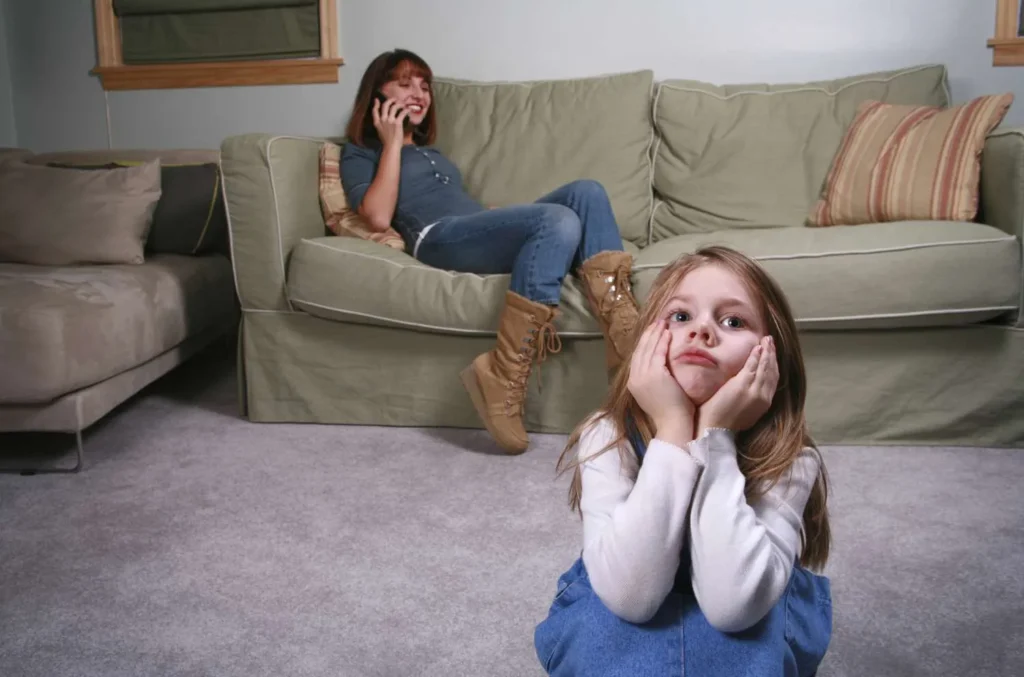Do you want to know the potential signs of a bad babysitter? If yes, keep reading to know the signs of a bad babysitter.

Selecting a reliable and responsible babysitter is a priority for parents entrusting the care of their children to someone else.
Unfortunately, there are instances where a babysitter may exhibit concerning behavior that puts a child’s safety at risk.
This guide aims to highlight signs of a bad babysitter, empowering parents to recognize potential red flags and take necessary steps to ensure their child’s well-being.
Signs of a Bad Babysitter

Here are potential signs of a bad babysitter:
1. Inattentiveness to Your Child’s Needs
A good babysitter should be attentive to your child’s needs, including meals, nap times, and play activities.
If you observe a lack of engagement or attentiveness, it may be a sign of a bad babysitter.
A caregiver’s attentiveness is vital for ensuring the child’s well-being and fostering a positive environment.
2. Frequent Cancellations or Tardiness
Consistent cancellations or tardiness without valid reasons can disrupt your plans and suggest a lack of commitment and reliability on the part of the babysitter.
Reliability and punctuality are crucial qualities for a babysitter to provide consistent and dependable care.
3. Neglecting Safety Precautions
A bad babysitter may neglect safety precautions, such as leaving hazardous items within a child’s reach, ignoring safety gates, or disregarding other essential safety measures.
Furthermore, prioritizing safety is fundamental to providing a secure environment for the child.
4. Ignoring Specific Instructions
A reliable babysitter should follow specific instructions you provide regarding your child’s routines, dietary restrictions, and any other crucial guidelines.
Disregarding these instructions is a cause for concern as it reflects a lack of respect for the parent’s guidance.
5. Sudden Negative Changes in Your Child’s Behavior
Notice any sudden changes in your child’s behavior, such as increased anxiety, withdrawal, or signs of distress.
Also, these changes may indicate negative experiences during the babysitter’s care, necessitating further investigation and action.
6. You Notice Unexplained Injuries or Bruises on Your Child
Consistently finding unexplained injuries or bruises on your child raises significant concerns about the babysitter’s ability to ensure a safe environment.
Swift action is necessary to address potential safety issues and protect the child from harm.
7. Your Babysitter Rarely Give You Feedback
A reliable babysitter should be communicative and provide updates on your child’s well-being, activities, and any notable incidents that occurred during their care.
Open communication is essential for parents to stay informed and ensure the child’s needs are met.
8. Inappropriate Discipline Tactics
Be vigilant for signs of inappropriate discipline tactics, such as yelling, harsh punishment, or any form of emotional or physical abuse.
A good babysitter should prioritize positive reinforcement and age-appropriate disciplinary measures, promoting a healthy and respectful environment.
9. Noticing Reluctance or Fear in Your Child’s Interaction with the Babysitter
If your child expresses reluctance or fear about being left alone with the babysitter, it’s crucial to investigate the reasons behind these feelings.
In addition, the child’s comfort and trust in the caregiver are paramount for a positive babysitting experience.
10. Your Child is Unwilling to Engage in Open Communication
An unwillingness to engage in open communication or provide updates on your child’s well-being may indicate a lack of transparency and raise questions about the babysitter’s professionalism.
Effective communication builds trust and ensures a collaborative approach to childcare.
In conclusion, being attentive to signs of a bad babysitter is crucial for safeguarding your child’s safety and well-being.
By staying vigilant, communicating openly, and taking swift action when needed, parents can ensure a secure and nurturing environment for their children.
Prioritizing the child’s safety, development, and happiness is paramount in selecting and monitoring a babysitter.
Related Searches:
